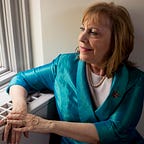Is Personal Freedom More Important Than Caring For Others?
This Fourth of July weekend, I’ve been thinking of something Peter Maurin of the Catholic Worker movement was fond of saying: that the aim of people of faith should be to build “the kind of society where it is easier for people to be good.”
I’ve also been thinking of Lynika Strozier, a remarkable young woman from Chicago.
Lynika’s mother was addicted to drugs. At eight, Lynika was identified as being “learning disabled.” Through hard work, grit, and the support of a loving grandmother, she graduated from college. She then earned two master’s degrees and became a DNA researcher at Chicago’s famed Field Museum of Natural History.
Lynika is no longer with us. She died in June from complications of the corona virus. She was 35.
I remember Lynika — and her promising life cut short — every time I come across another report about opposition to mandatory restrictions for combatting COVID-19.
Astoundingly, protests against face masks and prohibitions against gathering in large groups are continuing, even as the COVID death toll continues to rise nationwide and several states reach new milestones in their number of infections.
To every person of faith, I ask: do our constitutional rights and personal freedoms outweigh our common call to compassion and concern for others?
Whatever faith one follows, we share a common summons to love one another. Or, as The Rule of St. Benedict puts it so well, our way of acting is should be different from the world’s way: “No one is to pursue what he judges better for himself, but instead what he judges better for someone else.”
This past week, a television commentator decried the fuss that ensued over the gathering of several thousand people for a Fourth of July fireworks celebration at South Dakota’s Mount Rushmore. Why should masks or social distancing be required, the commentator asked, when there have been only 91 deaths from COVID in all of South Dakota?
Only 91? For 91 distinct families, those deaths represent the loss of a father, mother, grandfather, grandmother, brother, sister, or child. It isn’t a matter of only for each of those families. Every person lost, like Lynika Strozier from Chicago, is also a link subtracted from our common human family.
Sadly, the debate over masks and whether it’s wise to gather in large groups has devolved into a senseless political battle. The discussion should really be about extending compassion.
As a society, we already engage in many acts to protect the common good. We stop for red lights. We put on seat belts. We don’t smoke in public places. We pay taxes. The list goes on.
My friend, Benedictine Sister Mary John Seyler, lives at Holy Angels Monastery in Jonesboro, Arkansas. Hers is one of the states that resisted putting in place mandatory precautionary measures and is seeing corona infections spike.
Sister Mary John, who is 91, sends out a weekly newsletter from the monastery and wrote this week of the balance we are called to keep between our personal freedoms and those we forgo out of concern for others.
“I have the obligation to seek the common good before I indulge my personal rights,” she said. “Yes, restrictions are a nuisance, but can avoiding a nuisance justify causing harm, serious harm, to others? Many others?”
Many of the signs at the anti-restrictions rallies are about “me” and “my.” I prefer to focus on the sign placed outside the state Capitol building in Frankfort, Kentucky early on in the pandemic. It says, “We will get through this together.” We … together.
This week, can we reflect on how we, individually and with our communities, can help to bring people together, and build a country where it is “easier for people to be good?”
We simply have to, for the sake of Lynika Strozier and all the others who have died.
